 Amphibious armored vehicle unit conducts open sea drill
Amphibious armored vehicle unit conducts open sea drill
 Water relay in Henan
Water relay in Henan
 Ethnic culture feasts eyes of travelers
Ethnic culture feasts eyes of travelers
 80 security dogs assembled in Nanjing police dog training base
80 security dogs assembled in Nanjing police dog training base
 Graffiti artists paint on street walls in Xinjiang
Graffiti artists paint on street walls in Xinjiang
 Story of ceramic artist Zhang Lingyun
Story of ceramic artist Zhang Lingyun
 Magic summer night dream in Hongyuan
Magic summer night dream in Hongyuan
 Incredible creatures in headwaters drainage region of Lancang River
Incredible creatures in headwaters drainage region of Lancang River
 The future of rock n' roll seen in young rockers in China
The future of rock n' roll seen in young rockers in China
 Magnificent Yanziya Cliff
Magnificent Yanziya Cliff
A HISTORY TO BE REMEMBERED
"It was a sunny day that day," said 74-year old Kenji Kumagai recounting the day of Aug. 15, 1945.
Kumagai was only five by then and lived in Tonghua region of China's northeastern Jilin Province. He remembered on that day, his mother told him in a flurry that she saw Chinese peasants in their neighborhood putting up Chinese national flags, a scene they had never seen before.
"It was not until then that everybody realized that we are living in a country that belonged to others, on a land that belonged to others. We Japanese have been occupying others' land," Kumagai recounted.
Kumagai said it was absolute that Japan was wrong before the day of surrender, and was reborn after Aug. 15.
Hiroshi Akiyama was born in 1962, 17 years after Japan's surrender. The V-J day 69 years ago to him is closely connected to his memories of his grandfather, who was a soldier during Japan's aggression against China.
"My grandparents never talked about his past in the war," said Akiyama, citing that once, when a television broadcasted a live memorial service to the war dead, his grandfather quickly switched it off.
"I think it is a sentiment of aversion," said Akiyama. "He did not want to be reminded of the memories of war. It perhaps was a permanent trauma to people like him."
But Japan's younger generation seems to have been "desensitized" to the war and its lessons.
Sato, a college student, said he is supportive of Abe's decision to lift the ban on exercising the right of collective self-defense. "Japan could help those nations that could not save themselves. From this point of view, I think the lifting of the ban is good," he said.
That Emperor Hirohito was spared from trial as a war criminal has made Japan "a society bearing no responsibility," said Professor Nobuyoshi Takashima, trying to explain Japanese youths' distorted understanding of history.
The professor at the University of the Ryukye added that Japan's education also does not touch on the topic of Japan's waging of the war.
DISTORTION OF HISTORY
Japan has never called the Aug. 15 the day of defeat or the day of unconditional surrender. Instead, it calls it "the day when the war ended" to shun its crimes and the lessons.
Akira Nakamura, a former editorial board member of Japan's Kyodo News Agency said Japan's ruling class at that time did not want to admit the defeat for fear of bearing the responsibilities of the war, especially the responsibilities of Emperor Hirohito and its loyalists and relatives.
It was a brainwash to use the word "end" instead of defeat and surrender, said Nakamura.
Okimatsu said that in Japan, both its leadership and general public failed to recognize the real cause of their defeat. "Many people just feel ashamed, but do not know or intend to find out why Japan waged such a war that caused great damage to other Asian countries and how they were defeated," he said.
Even some veterans believe they were only defeated by the United States and were not a loser in the Chinese battleground.
"Every Japanese shall ask themselves what the day Aug. 15 truly means," said Okimatsu.
 |
 Beijing policewomen posters become a hit
Beijing policewomen posters become a hit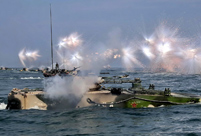 Armored regiment trains on the sea
Armored regiment trains on the sea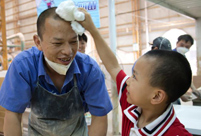 Children spend 'Father's Day' with dads at work
Children spend 'Father's Day' with dads at work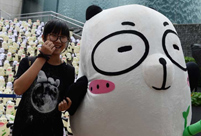 'Pan Da' appear in Shanghai World Financial Center
'Pan Da' appear in Shanghai World Financial Center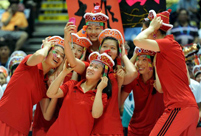 Champions take selfies on podium
Champions take selfies on podium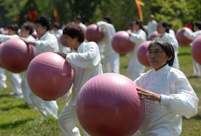 National Fitness Day celebrated around China
National Fitness Day celebrated around China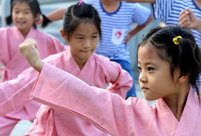 Traditional culture colors summer vacation
Traditional culture colors summer vacation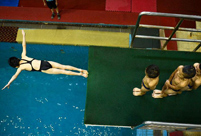 Young athletes fighting for their dreams
Young athletes fighting for their dreams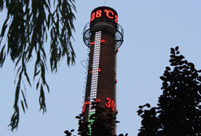 68 meters high thermometer in Shanxi, called ‘fighter’ of thermometers
68 meters high thermometer in Shanxi, called ‘fighter’ of thermometers The vanishing folk skills
The vanishing folk skills Intoxicating beauty of Dali, Yunnan province
Intoxicating beauty of Dali, Yunnan province Memorable moments of Ludian earthquake
Memorable moments of Ludian earthquake Bring world together to help elephant
Bring world together to help elephant 'Building Dreams'
'Building Dreams'  Labrang Monastery
Labrang MonasteryDay|Week|Month